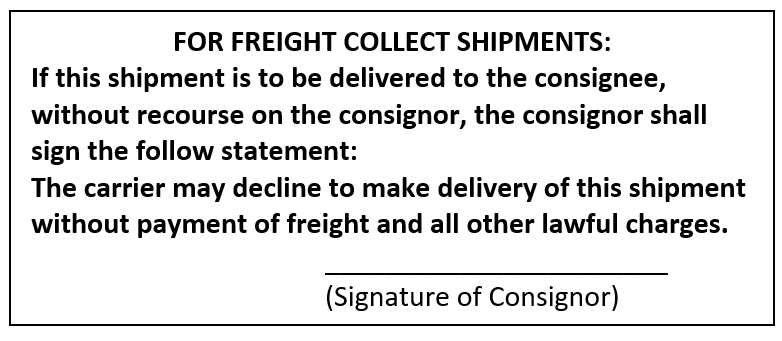In December 2022, the National Motor Freight Traffic Association (NMFTA) published a thoroughly revised Uniform Straight Bill of Lading as part of the National Motor Freight Classification (NMFC). Although many parcel shipments move pursuant to the terms of an air bill, other parcel shipments are transported by motor carriers pursuant to the NMFC Bill of Lading.
One of the most significant revisions to the new Uniform Bill of Lading relates to Section 7 of the Bill of Lading Terms. Previously, Section 7(a) stated:
The consignor or consignee shall be liable for the freight and other lawful charges accruing on the shipment, as billed or corrected, except that collect shipments may move without recourse to the consignor when the consignor so stipulates by signature or endorsement in the space provided on the face of the bill of lading.
This was known as a non-recourse provision. It provided a method for a consignor to avoid liability for freight charges on a collect shipment by entering a signature or endorsement in what was known as the Section 7 box on the Bill of Lading. If the carrier accepted the shipment for pickup, then the carrier would not be able to go back against the consignor for the freight charges in the event the consignee did not pay.

The Section 7 box no longer appears on the Bill of Lading. Section 7(a) of the new Terms reads as follows:
The consignor, consignee, or shipper shall be liable for the freight and other lawful charges accruing on the shipment, as billed or corrected as specified in 49 U.S.C. §13710, and carrier may require prepayment of the charges prior to delivery and refuse to give up possession at the destination until payment is made, as specified in 49 U.S.C. § 13707(a).
In other words, when it is a “collect” shipment the consignor will always be liable to the carrier for its freight charges if the consignee fails to pay the carrier, unless there is an individually negotiated contract stating otherwise. Accordingly, parcel shippers need to be aware of this. If it is their customary practice to ship “collect” and have previously been endorsing the Section 7 box, they should now include, or try to include, such a provision in an individually negotiated contract with the carrier.
All for now!
Brent Wm. Primus, J.D., is the CEO of Primus Law Office, P.A. and the Senior Editor of transportlawtexts, inc. Previous columns, including those of William J. Augello, may be found on PARCELindustry.com. Your questions are welcome at brent@primuslawoffice.com.
This article originally appeared in the May/June, 2023 issue of PARCEL.
















